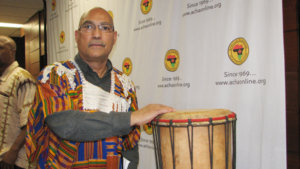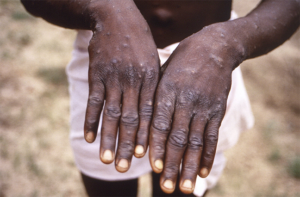
By Lincoln DePradine
A reemergence is being reported in Canada and abroad, especially in Africa, of cases of mpox — formerly known as monkeypox. As a result, Toronto Public Health (TPH) officials are urging city resident to get vaccinated against mpox.
Trinidad-born health specialist, Dr Akwatu Khenti, says members of the Black and Caribbean community should heed the vaccination call of the TPH.
“An ounce of prevention is worth a pound of cure,” Khenti told The Caribbean Camera. “Get vaccinated,” he appealed.
Mpox was declared a global emergency in July 2022 by the World Health Organization (WHO), after the virus spread to more than 70 countries.

Prior to 2022, mpox had mostly been seen in sporadic epidemics in Central and West Africa when people came into contacted with infected animals.
Canada, unlike the United States, wasn’t collecting race-based data on the effects of the mpox virus two years ago, amidst the heightened concerns with the simultaneous presence of mpox and COVID-19 in the society.
Khenti, in an interview at the time as chair of the Black Scientists’ Task Force (BSTF) on Vaccine Equity, pointed to data in the US on mpox’s impact on people of African descent.
The figures in the United States, for African-Americans, were startling, said Khenti, who is an assistant professor at the Dalai Lama School of Public Health of the University of Toronto.
“US data indicates that although the Black population is 12 percent, the number of people with mpox is 26 percent Black,’’ said Khenti.
“At the state level in the US – from places like North Carolina and Georgia – Blacks range from 70 percent to 82 percent of the mpox infections. What makes it even more troubling is Black are under-vaccinated.’’
According to WHO, mpox cases have now been spreading in multiple countries in Africa, leaving hundreds dead, thousands sick and inflicting suffering in nations previously spared from the viral disease.
Cases in Africa have surpassed 15,000 this year, exceeding the toll in all of 2023. Infections are concentrated in the Democratic Republic of Congo, where mpox has been endemic for decades.
Mpox, however, has spilled into countries that have never recorded outbreaks, including Kenya and the Ivory Coast.
“This is a major alarm for the world. We are losing the youth in Africa,” said Jean Kaseya, director general of the Africa Centers for Disease Control and Prevention. “This new incident demonstrates the need for a collective and collaborative approach in curbing the spread of the disease.”
A spike in reported cases of mpox was reported in late June and July in Toronto, following major events and festivals in the city.
In a news release, Toronto Public Health said it has seen 93 confirmed cases as of July 31. This time last year, the city’s case count stood at 21.
Vaccination, says TPH, is the best way to prevent further spread of mpox and recommends two doses given at least 28 days apart for the best protection.
Black community members should “reduce the risk’’ of contracting mpox by getting vaccinated, said Khenti.
“If you have any risk factors, get vaccinated. It’s better to get vaccinated than not to,” he said.
TPH, expressing concern, said “there are still a number of people who haven’t been immunized and about over 70 percent of the individuals who contracted mpox this year have not had one dose or two doses of the vaccine.”
At the moment, “mpox has spread mostly between people who have had close/intimate or sexual contact with a person who has the virus – with gay, bisexual and other men who have sex with men being most affected”.
Fever, chills, swollen lymph nodes, exhaustion, muscle aches and backache, headache, nasal congestion and sore throat and other respiratory symptoms are signs associated with contracting the mpox virus. However, the most visible sign is a rash.
“People with mpox get a rash that may be located on or near the genitals (penis, testicles, labia, and vagina) or anus (butthole) and could be on other areas like the hands, feet, chest, face, or mouth,’’ according to the US-based Centers for Disease Control (CDC).
The rash, which will go through several stages, including scabs, before healing, can initially look like pimples or blisters. It may be painful or itchy.
Mpox symptoms, said the CDC, usually start within three weeks of exposure to the virus, and “can be spread from the time symptoms start until the rash has healed, all scabs have fallen off, and a fresh layer of skin has formed”.


